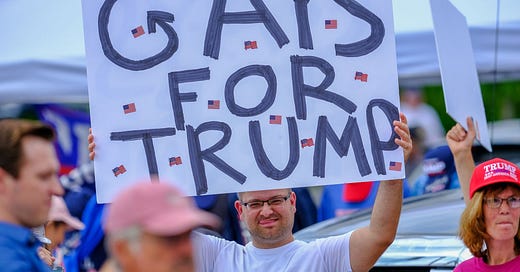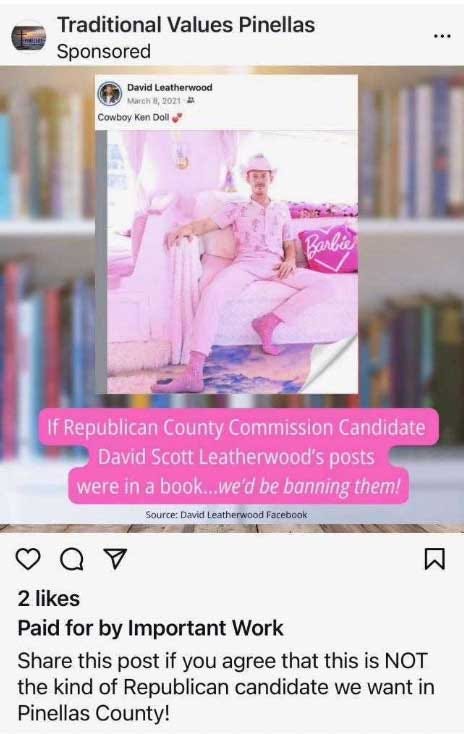
The Free Press

The issue of childhood transitions is a personal one for Clarkson Lawson, a 26-year-old gay content creator who’s voting for Donald Trump for president next week. I met him for coffee in downtown St. Petersburg, Florida, last month. He’s spoken out against juvenile transitions online because of his own experiences as a child.
“I used to wear my sister’s dresses. I remember a point in my childhood, I was sitting in our washer and dryer room, and I was like, “Mom, am I supposed to be a girl? I like everything that girls like.” And my mom’s like, “No, you’re a boy, but you can wear whatever you want.” And I go back to that moment very often, because if I was born now and my mom was a mother in California, I’d be on puberty blockers.”
He voted for Trump in 2020, but this year, he had been planning to vote for Robert F. Kennedy Jr., who vehemently opposes gender-affirming care for minors. When RFK Jr. dropped out, Lawson shifted his allegiance back to Trump—whose campaign website claims he intends to “Revoke Joe Biden’s cruel policies on so-called ‘gender affirming care.’ ”
Nevertheless, Lawson is skeptical of the more socially conservative end of the Republican Party. It’s easy to understand why. He said he still gets homophobic messages in response to his content from social conservatives “every day”—from people telling him to “repent,” warning him that he’s going to “burn in hell for eternity.”
But despite his discomfort with social conservatives, he’s still with them when it comes to backing Trump, because there are things he cares about more than his Instagram inbox. And it’s not just about radical trans politics. “I think Democratic administrations can be sometimes naive when it comes to immigration and law and order, and people will lose their lives because of it.”
In less than a week, millions of Americans will vote to elect the next president. Around 2.5 percent will be gay or lesbian and most of them, around 70 percent, will vote for Kamala. I talked to at least a dozen of those who won’t. What I found is not just a group of people who are deeply concerned about the economy and immigration—although they are—but also a new generation of gay conservatives who are deeply concerned about the excesses of the LGBT movement.
Many believe trans activism’s cultural association with gay people—best represented in the acronym LGBT—is responsible for a recent decline in support for gay marriage, particularly among conservatives. In 2021, 55 percent of Republicans supported same-sex marriage; earlier this year, that figure had shrunk to 46 percent.
“Attaching yourself to transgenderism can have social consequences,” said Wade, a 22-year-old gay college student from Miami, who’s planning to vote for Trump but did not want his full name published. “Support for gay marriage in the last couple of years has gone a little bit down after years and years and years of coming up,” he said, “probably because of that.”
This has left gay Republicans like Wade and Clarkson a minority within a minority, hated by almost everybody, caught between social conservatives who demonize them as sexual deviants on one hand, and on the other, an LGBT community that sees them as traitors.
A lot of the gay Republicans I interviewed became politically engaged because they felt that the Democratic Party was uncritically accepting of the most radical aspects of the trans movement. In March 2020, lesbian YouTuber Arielle Scarcella, who has over 772,000 subscribers, made a splash when she blasted the left for its stance on gender ideology.
“Trans rights is for the most part in conflict with gay rights,” Scarcella, who’s 38, told me. “If you say ‘gender is fake,’ it literally takes away the definition of being homosexual.”
“I felt like I was being lied to quite often,” she explained. And she spoke out because she feels LGBT voters are being taken for granted by the left. “They were being treated like an easy target for votes,” Scarcella told me, “because they just believed anything Democrats were saying.” Four years ago, she voted for Trump—and she plans to do the same again next week.
The response from the LGBT community to her political change of heart wasn’t positive. She was smeared as a “proud transphobe” in the gay press, and she spends a lot of time now debating her critics online. Scarcella also said dating as a conservative lesbian “is pretty difficult.” (She divides her time between Miami and New York City.)
She told me “women’s rights” were the most important thing to her in this election, noting that she means “the trans rights stuff” rather than abortion access, which the Democrats are campaigning hard on after the fall of Roe v. Wade. Like many critics of trans activism, Scarcella’s concerned about the presence of biological males in women’s spaces. She’s also skeptical of the activists’ advocacy of gender-affirming care for distressed youths, which supports life-changing surgery without parental approval. “I think that’s what a lot of people are having issues with, not that people want to transition as adults.”
Gay conservatives have never been particularly popular within the LGBT community. During the push for gay marriage in the early 2000s and 2010s, for instance, activists gleefully outed closeted GOP congressmen and staffers, calling it a crusade against hypocrisy. These days, the left-wing vitriol is directed less at those who stay silent on issues like gay marriage, and more at those who are outspoken in the culture wars, particularly on trans issues.
On October 7, former Pennsylvania lawmaker Brian Sims bashed gay attendees at a Republican fundraiser as “self-serving traitors” in The Advocate, the largest and oldest LGBT publication in the United States. One of the “traitors” named in the article was David Leatherwood, for smearing the gay community with the term groomer.
Leatherwood was sipping a black cherry White Claw when I met him on a rooftop bar in St. Petersburg earlier this month. He is 33 with red hair and a soft voice that has made him many enemies. This year, he ran to be the GOP candidate for Pinellas County Commissioner.
Leatherwood told me that he opposes transitions for children, and that he loves drag shows but doesn’t think kids should be allowed to watch them.
“It’s inappropriate,” he told me, adding that drag queens “should all just look at each other and be like, ‘This is common sense: We should not be going to read books to children. We should stay in the club, where we belong.’ ”
Leatherwood said he has used the term groomer to describe trans activists who he believes are pushing gender ideology on children. The Advocate argues that, in doing so, he is pushing a narrative that libels the entire LGBT community—which Leatherwood strongly denies. Years ago, he wrote on X that to equate “anti-groomer” with “anti-LGBT” “is not just ignorant, but insanely insulting to gays and lesbians across America who are vehemently against pedophilia and the sexualization of children.”
Leatherwood was a once a board member at Gays Against Groomers (also known as GAG), which describes itself as “an organization fighting back from inside the community against the sexualization, indoctrination, and medicalization of children happening under the guise of ‘LGBTQIA+.’ ”
He resigned from GAG in July 2023 after he learned that the founder of the organization, lesbian conservative Jaimee Michell, worked for Florida governor Ron DeSantis, whose primary presidential campaign took an anti-LGBT stance. Leatherwood points to an infamous ad shared by the DeSantis campaign—and widely denounced as “homophobic” by many gay Republicans—which knocked Trump for being pro-LGBT, and promoted DeSantis’s record as a defender of social conservatism.
But despite his objections to DeSantis, Leatherwood remained loyal to conservative politics, running for commissioner in his county, which includes St. Petersburg, in a GOP primary earlier this year. But that caused social conservatives to target him personally with homophobic abuse.
Leatherwood showed me a barrage of homophobic campaign advertisements from a group called Traditional Values Pinellas, linked to his primary opponent, Vince Nowicki. One reads: “If Republican County Commission Candidate David Scott Leatherwood’s posts were in a book. . . we’d be banning them.” It features an image of Leatherwood in a pink cowboy getup.
Leatherwood later dropped out of the race—to focus on his work on the Trump campaign, he said. But he still found the incident unnerving.
“I was expecting to get attacked, but I will say, I was still shocked at the level and to the degree in which they made their entire smear campaign against me for being gay,” Leatherwood told me. “It felt like a slap in the face.”
Despite that, he said that he wasn’t going to change his politics or back away from them. Like Lawson, he felt there were political issues he cared about more than his personal life. “Gay people can believe in lower taxes, strong order, and security,” Leatherwood said, calling this “a basic common-sense agenda.”
Another gay person who believes in lower taxes is Vince Natale, 34, a Republican who was canvassing for Trump in Pennsylvania when I reached him by phone. “I care about the economy and the border,” he said. “I don’t want to talk about transgenders in bathrooms. I’m just like, I don’t want to hear about this anymore, and I don’t care.”
Although he’s not a social conservative himself, Natale believes the obsession with identitarian politics on the far left has actually empowered the far right. “People are just sick of this.”
But nobody I spoke to was genuinely concerned that the Republican Party was going to take away same-sex marriage. Trump said he said he was “fine” with it when he came into office in 2016, although his platform then did include an endorsement of “traditional marriage and family, based on marriage between one man and one woman.” This year, however, there was no such endorsement in Trump’s latest platform, released in July—a subtle victory for gay rights in America.
“Nobody, nobody thinks gay marriage is being overturned,” said Casey Flores, an organizer for the Log Cabin Republicans, the country’s foremost gay GOP group, and—unbeknownst to me before our interview—Leatherwood’s ex-boyfriend.
“Even if the Supreme Court somehow turned it back to the states, Congress would pass it on a bipartisan basis the next day. I’m not too worried about it.”
But with homosexuals on their left calling them traitors, and homophobic social conservatives on their right, Flores emphasizes that gay people have nothing to fear from Trump, the showtune-listening Republican nominee at the top of the ticket. He’s the candidate for those who want to stop talking about their identity.
“He’s a Manhattan businessman. He doesn’t give a shit if you’re gay or straight.”
River Page is a reporter at The Free Press. Follow him on X @River_Is_Nice, and read his piece “Stop Saying Florida Isn’t Safe for Gay People. It’s Fine.”
Become a Free Press subscriber today:






